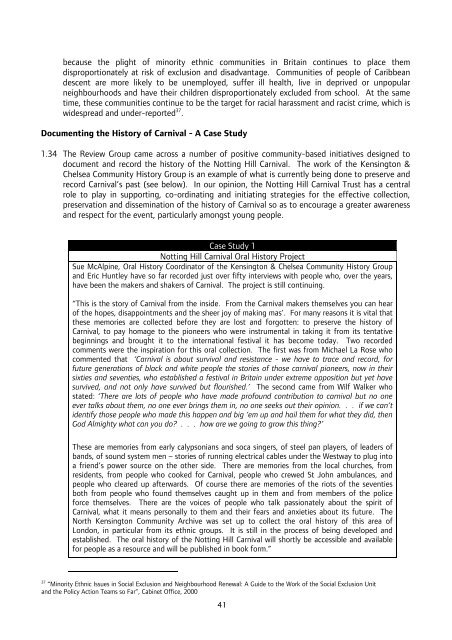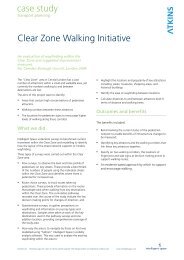Notting Hill Carnival Strategic Review - Intelligent Space
Notting Hill Carnival Strategic Review - Intelligent Space
Notting Hill Carnival Strategic Review - Intelligent Space
Create successful ePaper yourself
Turn your PDF publications into a flip-book with our unique Google optimized e-Paper software.
ecause the plight of minority ethnic communities in Britain continues to place them<br />
disproportionately at risk of exclusion and disadvantage. Communities of people of Caribbean<br />
descent are more likely to be unemployed, suffer ill health, live in deprived or unpopular<br />
neighbourhoods and have their children disproportionately excluded from school. At the same<br />
time, these communities continue to be the target for racial harassment and racist crime, which is<br />
widespread and under-reported 37 .<br />
Documenting the History of <strong>Carnival</strong> - A Case Study<br />
1.34 The <strong>Review</strong> Group came across a number of positive community-based initiatives designed to<br />
document and record the history of the <strong>Notting</strong> <strong>Hill</strong> <strong>Carnival</strong>. The work of the Kensington &<br />
Chelsea Community History Group is an example of what is currently being done to preserve and<br />
record <strong>Carnival</strong>’s past (see below). In our opinion, the <strong>Notting</strong> <strong>Hill</strong> <strong>Carnival</strong> Trust has a central<br />
role to play in supporting, co-ordinating and initiating strategies for the effective collection,<br />
preservation and dissemination of the history of <strong>Carnival</strong> so as to encourage a greater awareness<br />
and respect for the event, particularly amongst young people.<br />
Case Study 1<br />
<strong>Notting</strong> <strong>Hill</strong> <strong>Carnival</strong> Oral History Project<br />
Sue McAlpine, Oral History Coordinator of the Kensington & Chelsea Community History Group<br />
and Eric Huntley have so far recorded just over fifty interviews with people who, over the years,<br />
have been the makers and shakers of <strong>Carnival</strong>. The project is still continuing.<br />
“This is the story of <strong>Carnival</strong> from the inside. From the <strong>Carnival</strong> makers themselves you can hear<br />
of the hopes, disappointments and the sheer joy of making mas’. For many reasons it is vital that<br />
these memories are collected before they are lost and forgotten: to preserve the history of<br />
<strong>Carnival</strong>, to pay homage to the pioneers who were instrumental in taking it from its tentative<br />
beginnings and brought it to the international festival it has become today. Two recorded<br />
comments were the inspiration for this oral collection. The first was from Michael La Rose who<br />
commented that ‘<strong>Carnival</strong> is about survival and resistance - we have to trace and record, for<br />
future generations of black and white people the stories of those carnival pioneers, now in their<br />
sixties and seventies, who established a festival in Britain under extreme opposition but yet have<br />
survived, and not only have survived but flourished.’ The second came from Wilf Walker who<br />
stated: ‘There are lots of people who have made profound contribution to carnival but no one<br />
ever talks about them, no one ever brings them in, no one seeks out their opinion. . . if we can’t<br />
identify those people who made this happen and big ‘em up and hail them for what they did, then<br />
God Almighty what can you do? . . . how are we going to grow this thing?’<br />
These are memories from early calypsonians and soca singers, of steel pan players, of leaders of<br />
bands, of sound system men – stories of running electrical cables under the Westway to plug into<br />
a friend’s power source on the other side. There are memories from the local churches, from<br />
residents, from people who cooked for <strong>Carnival</strong>, people who crewed St John ambulances, and<br />
people who cleared up afterwards. Of course there are memories of the riots of the seventies<br />
both from people who found themselves caught up in them and from members of the police<br />
force themselves. There are the voices of people who talk passionately about the spirit of<br />
<strong>Carnival</strong>, what it means personally to them and their fears and anxieties about its future. The<br />
North Kensington Community Archive was set up to collect the oral history of this area of<br />
London, in particular from its ethnic groups. It is still in the process of being developed and<br />
established. The oral history of the <strong>Notting</strong> <strong>Hill</strong> <strong>Carnival</strong> will shortly be accessible and available<br />
for people as a resource and will be published in book form.”<br />
37<br />
“Minority Ethnic Issues in Social Exclusion and Neighbourhood Renewal: A Guide to the Work of the Social Exclusion Unit<br />
and the Policy Action Teams so Far”, Cabinet Office, 2000<br />
41








